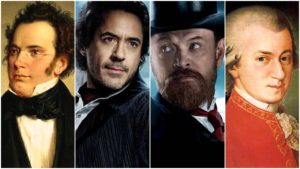
Opera Meets Film: ‘Don Giovanni’ & Schubert Explore Moriarty & Sherlock Holmes’ ‘Game of Shadows’
By David Salazar“Opera Meets Film” is a feature dedicated to exploring the way that opera has been employed in cinema. We will select a section or a film in its entirety, highlighting the impact that utilizing the operatic form or sections from an opera can alter our perception of a film that we are viewing. This week’s installment features Guy Ritchie’s “Sherlock Holmes: A Game of Shadows.”
It is worth beginning with the understanding that “A Game of Shadows” actually presents a major payoff from its predecessor. At one point in the first “Sherlock Holmes,” Holmes (played by Robert Downey Jr.) invites Watson (Jude Law) to go see the Mozart work together, but they never do.
However, two years and one movie later, the two are darting toward the Paris Opera intent on stopping a bomb going off inside the theater with Mozart’s opera front and center.
This is more than just a musical payoff from the first film, but also a narrative one. Professor Moriarty is but hinted at in that first film as the big bad, making cameos in disguise before revealing himself fully in “A Game of Shadows.” As such, the opera, and some music by Schubert, come to represent the battle between Sherlock Holmes and Moriarty in this movie.
The Opera
As they race across the Parisian streets, the opening of the overture makes an appearance, albeit in a whole new orchestration by film composer Hans Zimmer, the music deeper and darker to hue closer to Zimmer’s own style. Eventually, Mozart’s score enters the soundtrack, but always married to Zimmers far more percussive style creating a unique orchestral texture and corresponding effect.
Here is the scene for context.
Using opera and classical music in suspense thrillers is nothing new and this particular scene follows in a lengthy tradition first crystallized by Alfred Hitchcock in “The Man Who Knew Too Much.” In that film, the central characters enter a crowded theater to stop an assassination attempt. In 2015, the “Mission Impossible” series would also include an opera scene of its own during an assassination attempt.
“Sherlock Holmes,” which was released in 2011, keeps to this tradition, but with a twist – Holmes is tricked by Moriarty and winds up in the wrong place altogether. The assassination actually takes place at a Hotel and Holmes is too late to prevent it.
The scene from “Don Giovanni” is not insignificant and the reversal of failure on the hero’s part is also worth noting.
First off, this is undeniably the most suspenseful and darkest of scenes in the opera, the music suggesting the impending doom for the title character. Again, and most importantly, it signals the collision between two unstoppable forces – Don Giovanni the uncontrollable sinner and the Commendatore, who represents divine justice. This mirrors the corresponding emotional battle of wits between Holmes and Moriarty. One might intuit that Holmes is the stand-in for the Commendatore while Moriarty, who is hellbent on creating chaos for his own gain, is Don Giovanni.
But Ritchie inverts the relationship by having Moriarty triumphant at the end of the scene. As Holmes enters the Hotel to watch the aftermath of the explosion, we hear the music of the infernal demons coming to take Giovanni; the Commendatore has won and the Don is going to hell. But in the case of the film, it is not Moriarty going to hell, but the world about to be locked in global conflict, per Moriarty’s design. The darkness and percussive nature of this climax is further driven home by how the images are edited precisely to the music, with the intercutting between the two scenes adding to the emotional counterpoint.
It must also be noted that Giovanni and the Commendatore play a game of sorts, with the two engaged in mortal combat at the start of the work. Giovanni then invites the Commendatore over for dinner in a challenge that he doesn’t think will be fulfilled. But the Commendatore not only appears, but does so with the upperhand, which he ultimately uses to defeat Don Giovanni.
As such, “Sherlock Holmes: A Game of Shadows” plays on this metaphor between the two characters, with the two men constantly challenging each other to the very end. Chess and card games become motifs throughout the story, as do two other vocal selections that make appearances in the film – Schubert’s “Fischerweise” and “Die Forelle.”
Both songs speak of a fisherman trying his utmost to catch a stubborn fish, both with contrasting endings for the fish. “Fischerweise” appears during their first encounter with Holmes entering Moriarty’s office, reciting and then translating the text of the song.
“Give up your foolish trickery,” Holmes says, to which Moriarty responds (still translating the song), “This fish, you cannot cheat.”
This, of course, suggests the conflict of the men engaged in the eternal battle of fisherman and fish. One trying to catch the other to put an end to their conflict.
But which of these is the fisherman and which is the fish? This is the very question that Moriarty asks during their second encounter, as seen below.
Moriarty intuits that he has won (and he punctuates the victory by literally hooking Holmes) and so he sings the piece triumphantly, a reflection of the fisherman catching the trout in the song. Ironically, he referred to himself as the fish in the “Fischerweise” scene, a truth which will bear itself out at the climax of the film when Moriarty realizes that his red notebook was stolen by Holmes and replaced (during the scene of his capturing Holmes no less), by a red notebook that depicts a fisherman catching a fish. Yet it ultimately resolves nothing for the two men with Holmes realizing that they are truly mirrors of one another and only by sacrificing himself can he defeat Moriarty.
The three major vocal selections in the film are aimed at musically dramatizing the game of cat and mouse between the two men. A perpetual chess match. A battle of wills. A game of shadows.



